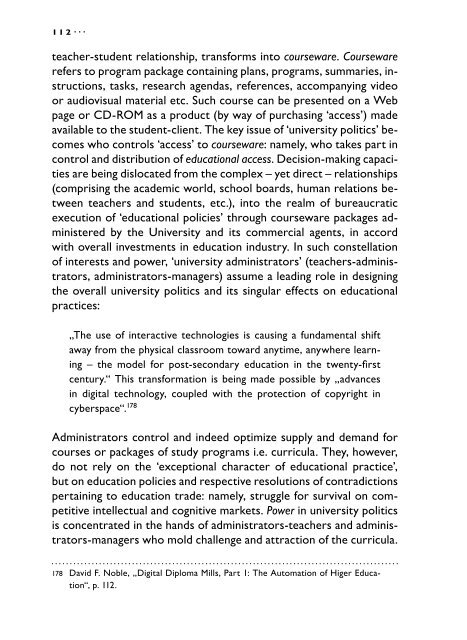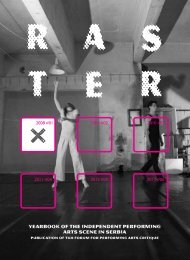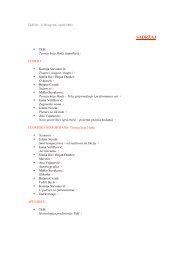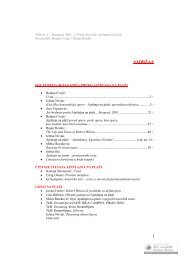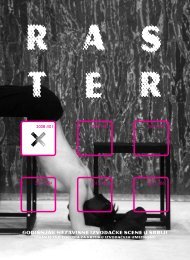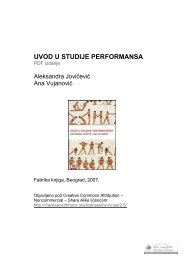Miško Šuvaković Epistemology of Art - TkH
Miško Šuvaković Epistemology of Art - TkH
Miško Šuvaković Epistemology of Art - TkH
You also want an ePaper? Increase the reach of your titles
YUMPU automatically turns print PDFs into web optimized ePapers that Google loves.
112··· ··· 113<br />
teacher-student relationship, transforms into courseware. Courseware<br />
refers to program package containing plans, programs, summaries, instructions,<br />
tasks, research agendas, references, accompanying video<br />
or audiovisual material etc. Such course can be presented on a Web<br />
page or CD-ROM as a product (by way <strong>of</strong> purchasing ‘access’) made<br />
available to the student-client. The key issue <strong>of</strong> ‘university politics’ becomes<br />
who controls ‘access’ to courseware: namely, who takes part in<br />
control and distribution <strong>of</strong> educational access. Decision-making capacities<br />
are being dislocated from the complex – yet direct – relationships<br />
(comprising the academic world, school boards, human relations between<br />
teachers and students, etc.), into the realm <strong>of</strong> bureaucratic<br />
execution <strong>of</strong> ‘educational policies’ through courseware packages administered<br />
by the University and its commercial agents, in accord<br />
with overall investments in education industry. In such constellation<br />
<strong>of</strong> interests and power, ‘university administrators’ (teachers-administrators,<br />
administrators-managers) assume a leading role in designing<br />
the overall university politics and its singular effects on educational<br />
practices:<br />
„The use <strong>of</strong> interactive technologies is causing a fundamental shift<br />
away from the physical classroom toward anytime, anywhere learning<br />
– the model for post-secondary education in the twenty-first<br />
century.“ This transformation is being made possible by „advances<br />
in digital technology, coupled with the protection <strong>of</strong> copyright in<br />
cyberspace“. 178<br />
Administrators control and indeed optimize supply and demand for<br />
courses or packages <strong>of</strong> study programs i.e. curricula. They, however,<br />
do not rely on the ‘exceptional character <strong>of</strong> educational practice’,<br />
but on education policies and respective resolutions <strong>of</strong> contradictions<br />
pertaining to education trade: namely, struggle for survival on competitive<br />
intellectual and cognitive markets. Power in university politics<br />
is concentrated in the hands <strong>of</strong> administrators-teachers and administrators-managers<br />
who mold challenge and attraction <strong>of</strong> the curricula.<br />
178 David F. Noble, „Digital Diploma Mills, Part 1: The Automation <strong>of</strong> Higer Education“,<br />
p. 112.<br />
These changes essentially affect attributes <strong>of</strong> the work <strong>of</strong> teacherslecturers<br />
or teachers-instructors. A teacher devoted to Western<br />
humanist tradition had based his work on direct contacts with his<br />
students: he predominantly relied on live performance <strong>of</strong> teaching<br />
and interaction with individual or collective student subject/s. Such<br />
teaching, above all, implies performing <strong>of</strong> events which underlie the<br />
educational practice. New interactive and Web technologies effect<br />
transformations <strong>of</strong> teaching, from performative work to production<br />
labour providing educational or courseware packages marketed by<br />
their administrators through commercially affiliated institutions. Owing<br />
to administrative mediation teaching is disciplined, deferred and<br />
deterritorialized:<br />
Once faculty and courses go on line, administrators gain much<br />
greater direct control over faculty performance and course content<br />
than ever before, and the potential for administrative scrutiny, supervision,<br />
regimentation, discipline, and even censorship increases<br />
dramatically. 179<br />
Technological standardization <strong>of</strong> courses and study programs leads<br />
to a territory where course development is not governed by artistic<br />
or academic demands, but system solutions verified by standards and<br />
their administrative implementation. In other words, teachers can not<br />
modify their courses without administrative, meaning, organizational/<br />
managerial i.e. market sanctions.<br />
Addressed transformations in university operations, aiming at standardized<br />
educational packages and ‘highly’ controlled administrative<br />
approach to education, advocate the ideal <strong>of</strong> pragmatic universal and<br />
compatible knowledge available to each ‘consumer’ by means <strong>of</strong> the<br />
cognitive market. Advantages <strong>of</strong> online standardized education are<br />
potential deterritorializations and global mobility <strong>of</strong> the ‘universal’<br />
knowledge, as opposed to site-specific and time-specific confines.<br />
179 David F. Noble, „Digital Diploma Mills, Part 1: The Automation <strong>of</strong> Higer Education“,<br />
p. 112.


